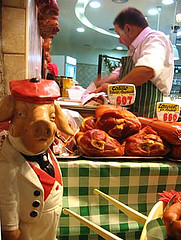

| El Subjuntivo | Subjunctive |
Most of the tenses we've encountered so far (the present, past, future) describe concrete reality- that which is happening, happened, or will happen. The subjunctive (see subjunctive conjugations) expresses a reality that isn't concrete- what someone wants to happen or what might happen, for example.
In the following sentences, the subjunctive is used in the phrases expressing
what someone wants--volition.
Le gustaría que estemos en la fiesta.
She would like that we be at the party.Quiero que escuches la canción.
I want you to listen to this song.Ojalá que les bébés duermen bien.
I hope that the babies sleep well.
In all but a few rare cases, the subjunctive will appear only in subordinate phrases- phrases introduced by the relative pronoun que. However, just because a verb is in a subordinate phrase does not mean it must be a subjunctive. The following subordinate phrase expresses concrete reality.
Es verdad que Alphonse habla el italiano.
It's true that Alphonse speaks Italian.
Beyond querer and me gustaria, volition can be expressed by giving orders, prohibiting something, or in any other way where some desire is expressed.
Su ambition es que su hijo se vuelva presidente.
His/her ambition is that his/her son become president.El rey insiste que usted se case con su hija.
The king insists that you marry his daughter.
The subjunctive is also frequently used whenever there is judgement being made.

Es bueno que te cases con el hijo del carnicero.
It's good that you are marrying the butcher's son.Su padre aprueba que ella estudie en la universidad.
His father approves that she studies in the university.Que bueno que te vayas!
How good that you are leaving!Que increible que él sea tan alto!
How incredible that he is so tall!
This is just a quick introduction to the subjunctive. Fully understanding it and all its nuances requires more study.
| El Fin | The End |
| « previous page | next page » |